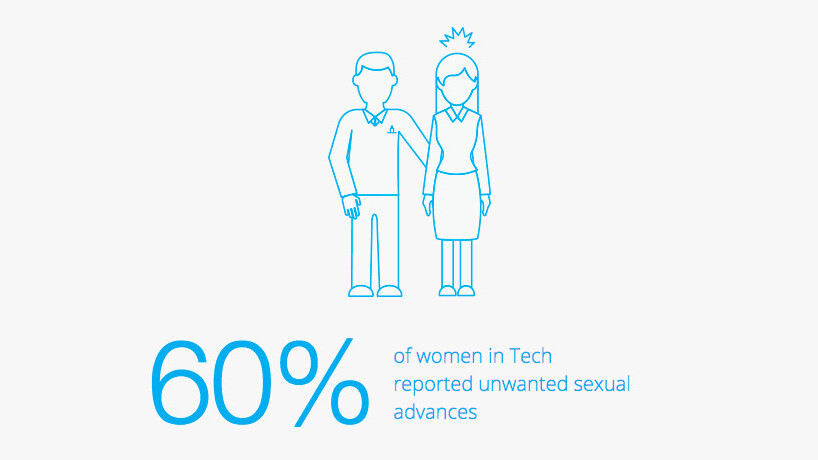The tech industry has a longstanding bad rep when it comes to its treatment of women. And now the obvious has become a lot more obvious with the release of a new survey detailing women’s experiences of exclusion, sexual harassment and more in Silicon Valley.
Elephant in the Valley
To say I was shocked with the findings would be wrong, but I was depressingly unsurprised by what the Elephant in the Valley project has unearthed.
Elephant in the Valley was inspired by “the incredible conversation from the Ellen Pao and Kleiner, Perkins, Caufield and Byers (KPCB) trial,” with one of its creators being Trae Vassallo, a former partner at Kleiner Perkins who testified in Pao’s trial that she’d also been harassed by the man in question.
Speaking to Recode’s Kara Swisher, Vassallo said:
The elephant is that women face a lot of conscious and unconscious bias in the workplace, and we wanted to get the data on the experiences that women face out in the public for conversation.
The group surveyed more than 200 women, focusing on those with at least 10 years’ experience. More than 70 percent of the women are over 40 years old and 75 percent have children.
These women are in positions of influence within their respective companies, according to the survey, with a quarter of them being senior executives, 11 percent are founders and another 11 percent work in venture.
Some of the women surveyed work for companies like Google, Apple and VMWare, as well as startups.
The results
As well as offering statistics that would depress any young aspiring woman (or man) in tech, You can add your own experience to the site via a submission form as well if you want.
Workplace dynamics
- 84 percent of the women surveyed have been told they were too aggressive and over half of those were told this on multiple occasions
- 47 percent were asked to complete tasks that were beneath their role, like taking notes or ordering food, something that their male counterparts were not asked or expected to do
Exclusion
- 66 percent felt excluded from key networking events and opportunities because of their gender
- 90 percent had witnessed sexist behaviour at off-site events, such as conferences
Unconscious bias
- 88 percent have had male colleagues or clients address questions at men that should go through them
- 87 percent reported having received demeaning comments from their male colleagues
Having ovaries
- 75 percent of the women had been asked about their family situation, marital status and children in their job interviews
- 40 percent admitted to consciously choosing to speak less about their family or children in order to be taken more seriously
- 52 percent of the women who took maternity leave decided to cut it short as they feared it would have a negative impact on their career
Sexual misconduct
- 60 percent of women reported that they have experienced unwanted sexual advances
- 65 percent of the advances were from a superior and half of those happened on more than one occasion
- 1 in 3 of the women admitted that they had felt unsafe because of the situation
Conclusions
- 60 percent of the women who reported instances of sexual harassment were dissatisfied with the course of action taken
- 39 percent did not report it because they thought it would have a negative impact on their job
- 30 percent didn’t report it out of fear and a further 29 percent signed non-disparagement agreements, which said they wouldn’t speak about the incidents
What does this tell us?
The figures paint a sad and backwards picture of a supposedly forward-thinking industry. If tech companies were as innovative and eager with the implementation of their staff codes of conduct as they are with sending press releases, we wouldn’t have women fearing for their positions because they’ve had to turn down everything from maternity leave to unwelcome sexual advances.
Vassallo told Recode:
This isn’t asking your coworker on a date. These are power play situations, where you’re turning someone down in a sexual way, and there’s some sort of meaningful impact on your ability to do your job.
It isn’t just colleagues not behaving well. These are bosses, people in superior situations, doing this to women they’re supposed to be helping mentor.
The volume of anecdotal evidence presented by the project is enough to open anyone’s eyes. One woman recalls how her boss groped her “while in public at a company event. After learning this had happened to other women in my department, and then reporting the event to HR, I was retaliated against and had to leave the company.”
Conferences
Another spoke of how at CES, a VC who told her he was committed to the National Venture Capital Association’s diversity task force, went on to discuss what strip clubs he would be going to while in Las Vegas.
Conferences appear to be a hotbed for this kind of activity, possibly because of the overwhelmingly low numbers of women usually in attendance. Having worked for a large tech conference prior to TNW, it became clear to me that a lot of the time, the events are more geared towards men than women, especially when it comes to the after-parties.
I once booked a speaker for an event who was relatively high-profile and following our call he sent me a series of DMs on Twitter, instead of my work email, asking inappropriate questions about my attendance at the event.
I was encouraged to respond so we didn’t lose him as a speaker but I was uncomfortable with the situation. After one interaction I blocked him on Twitter and then he cancelled his appearance.
In a more discouraging turn, I recently spoke to a 20-year-old male founder who expressed concern at the beginning of our call that his company might be “too tech” for me and questioned my experience.
His platform wasn’t targeted at men or women specifically, so there are clearly still underlying assumptions about gender and tech that haven’t gone away with a new wave of entrepreneurs.
That’s backed up by this pitch sent to serial entrepreneur and investor Eamon Leonard with “Help me lose my virginity?” as the subject line. It was actually sent in relation to this being the female founder’s first visit to the Web Summit
It’s more a representation of the state of the tech industry than the woman who sent the email.
What now?
The kind of sexism experienced by women in tech today is rapidly becoming a byproduct of the industry, with it being so entrenched in what we do that it’s almost unrecognizable, which is sad.
Silicon Valley, and the tech industry beyond it, prides itself on being exciting and innovative and creative in how it solves some of the biggest problems we face in the world today.
But it’s not really, because it’s choosing to ignore the one challenge knocking on its door since the year dot. It could disrupt sexism like it disrupts travel or dining, but it doesn’t.
If everyone else can recognize that the statistics shown by the Elephant in the Valley project are startling, then Silicon Valley needs to face this head on and show the world that it is truly a place that solves problems.
➤ Elephant in the Valley [via Recode]
Get the TNW newsletter
Get the most important tech news in your inbox each week.






